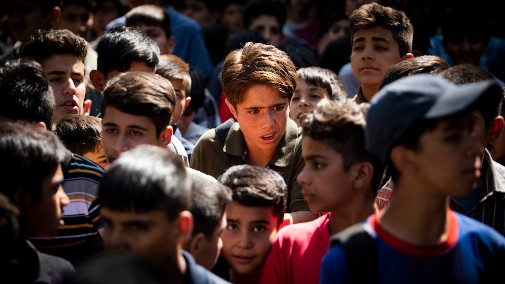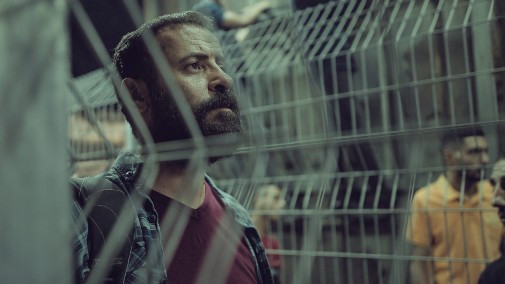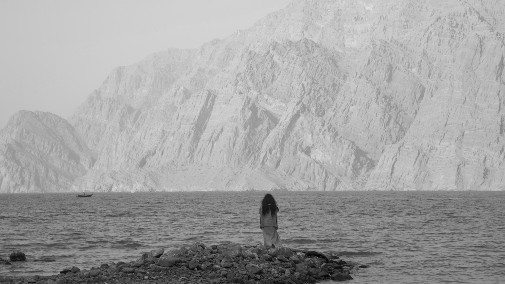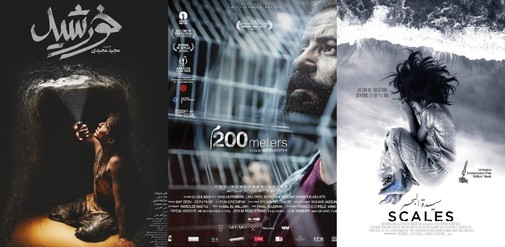Best International Feature: Iran, Jordan, Saudi Arabia
 Saturday, February 6, 2021 at 11:40PM
Saturday, February 6, 2021 at 11:40PM In the past decade, Middle Eastern cinema has been having a moment among Oscar voters. At the very least, the cinema of Asghar Farhadi has earned AMPAS' attention. The director's A Separation and The Salesman won the trophies for Best International Feature, and the first film got an additional nomination for Best Original Screenplay. As for other countries from the region, Israel, Palestine, Jordan, and Lebanon have each won at least one nomination in the past ten years. I'm excited to see if this trend continues in the 2020s. With that in mind, let's delve into the films submitted for the 93rd Academy Awards by Iran, Jordan, and Saudi Arabia…

SUN CHILDREN (Iran)
Some films feel like novels, even when they're the fruit of original scripts. The cinema of Arnaud Desplechin often features that quality, and I'm starting to think the same about the work of Iranian cineaste Majid Majidi. His latest, Sun Children, often comes off as a cinematic variation on Dickensian themes, a story of child misery in a merciless urban environment where innocent dreams collide violently with the harsh realities of an uncaring world. It revolves around Ali, a 12-year-old street urchin who spends most of his time small-time scams for a neighborhood crime lord. It's through that older man that the kid knows of a treasure hidden within the sewage pipes and tunnels that run underneath a local institution for impoverished minors, the Sun School. The plot is far from surprising, but its byzantine twists, turns, and tonal variations delight even as they horrify. The visual mastery of Majidi adds to the cinematic grandeur as it delineates a universe where several incompatible realities meet each other. There's the gritty chaos of the school, the melancholy of empty streets painted into palimpsests of squalor, the darkness within the bowels of the earth, the dream of a mall filled with promises of inaccessible wealth. Holding this all together is a broad, but intelligently grounded, performance by young Roohollah Zamani. The jury at the Venice Film Festival awarded him with the Marcello Mastroianni Award in 2020, and it's easy to see why. His is a face made for movie cameras, halfway between a cherub and the stern visage of a judgmental icon, stoic lines undercut by an emotional vulnerability that burns, lacerates. Even as it speeds to a gloomy conclusion, Sun Children never loses sight of its humanistic love for all the lives that step in front of the camera. Such qualities allow its nightmares to transcend exploitation and reach toward something more profound. B+

200 METERS (Jordan)
Mustafa lives an odd day-to-day existence, split between two nations, his soul sliced through by a militarized border that keeps him from the majority of his family. The man's wife and children live on Israeli land, only 200 meters from where the patriarch takes care of his old mother on the Occupied Territories. His construction work allows him to gain access to the other side, a professional umbilical cord uniting this devoted father to his children. However, one fateful day, that cord is snapped. His permit has expired, he can't enter Israel, he can't see the rest of his family. The fact his son has been taken to the hospital only galvanizes Mustafa's strong will, taking him on a picaresque odyssey to gain illicit access to the Israeli land. Played with utmost intensity by Ali Suliman, this distressed pater familias makes for a great protagonist. His plight serves as a synecdoche for his countrymen's collective dilemma, but there's enough specificity in the performance to elevate the character above a symbolic vacuum. Seeing Suliman negotiate through the dangerous situations in the story is as exciting as watching his moments of tenderness, silent intelligence, and weary compassion, even for those whose interests are precariously distant from his own. I'd love to say that the rest of the picture is up to the standards of its leading man, but 200 Miles fails to impress beyond the character of Mustafa. There's a wealth of needless side plots, unsurprising twists, a myriad of tense situations that feel more contrived than earned. All in all, 200 Meters is an engaging experience, anchored by a robust feat of acting that often drains cloying sentiment from the tender moments and allows the bleaker scenes to shine with humane generosity. B-

SCALES (Saudi Arabia)
Like an old legend shared from generation to generation or a fairytale recounted across centuries, Shahad Ameen's Scales could start with "once upon a time." The setting here is that of a barren island where hungry people live and nothing grows. To spare their families from death by starvation, the men have made a pact with the sea-dwelling creatures that surround the insular land. Their daughters are given to the mysterious beasts, sacrificed so that the fishermen may catch some food. One night, a man is unable to drown his beloved child, and so she grows under the rancorous gaze of everyone, including her mother, who blame her existence for their misery. When, upon the birth of another sibling, the father decides to give his oldest progeny to the waters, our doomed heroine fights back. Though it's barely feature-length, Scales often feels like a short padded within an inch of its life, every moment stretched well beyond reason. The characters remain as blurred sketches, unfinished and undefined, and none of the actors can breathe complex humanity into a feminist parable with roots in folklore. It's a pity that the result of the filmmakers' efforts is so unrewarding because there's a lot of talent evident in the formalism of the piece. Ameen knows how to use natural landscapes and textures to evoke an ominous mood and Portuguese cinematographer João Ribeiro delivers another visual tour-de-force, rendering the tale in silvery monochrome, making the rocky wasteland and dark waves into more present characters than the so-called protagonists. The intentions are commendable, the ideas have merit, and the execution shows cinematic promise, but Scales is never as good as the sum of its parts. C
After it made a splash at the Venice Film Festival, Sun Children seems well-positioned to earn the Academy's attention. Majid Majidi has directed Best International Feature nominee in the past, 1998's Children of Heaven, so we know AMPAS isn't averse to his brand of Dickensian cinema. As for 200 Meters and Scales, both projects feel destined to be ignored by Oscar voters, even if their acting and cinematography deserve praise, respect, and perhaps gold accolades.




Reader Comments (3)
Thanks again Claudio. I haven't had the chance to watch any of these films yet. :(
Loved Sun children (the whole story up to the end with the twist) as much as I didn't love Scales (although you're right about the cinematography...unfortunately, that won't make the movie good). Haven't had a chance to see 200 meters... don't even know where to catch it. Sun children should find itself among the 15 next tuesday and it has a fair chance to become nominated too.
Rod -- I hope you enjoy them if you get the chance to see them.
Kris -- I also believe SUN CHILDREN has high chances of getting into both the shortlist and the final lineup. It's very good and very much within AMPAS' usual ideas of prestige filmmaking.